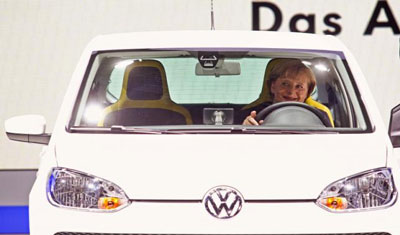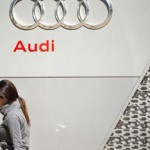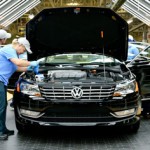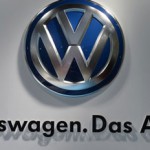VW Emissions Probe Zeroes In on Two Engineers

Volkswagen investigation focuses on two men elevated after Winterkorn was made CEO
Two top Volkswagen engineers who found they couldn’t deliver as promised a clean diesel engine for the U.S. market are at the center of a company probe into the installation of engine software designed to fool regulators, according to people familiar with the matter.
The two men, Ulrich Hackenberg, Audi’s chief engineer, and Wolfgang Hatz, developer of Porsche’s winning Formula One engines, were among the engineers suspended in the investigation of the emissions cheating scandal that sank the company’s market value by 43% since Sept. 18 and triggered a world-wide recall to refit the engines to meet clear-air standards, these people said.
Messrs. Hackenberg and Hatz, who didn’t respond to requests for comment, are viewed as two of the best and brightest engineers in German industry. They were put in charge of research and development at the Volkswagen group shortly after Martin Winterkorn became chief executive in January 2007. Mr. Winterkorn, who resigned over the scandal, couldn’t be reached for comment.
The company has acknowledged that managers, struggling to meet U.S. sales targets, masked the emissions of new-car engines to sell so-called clean diesel technology to skeptical American consumers. The car maker said as many as 11 million vehicles carried a “defeat device,” software that reduces tailpipe emissions only when the car is being tested, not on the road.
Several countries have since blocked sales of certain VW vehicles, and regulators are considering steps to tighten emissions standards for diesel engines.
The details haven’t been made public, but Volkswagen’s investigation is focused on Messrs. Hackenberg and Hatz, Mr. Winterkorn’s top aides during his tenure at Audi, as well as Heinz-Jakob Neusser, head of development at the VW brand, people familiar with the matter said.
Mr. Neusser, also suspended, joined VW from Porsche in 2011, long after the diesel engines began production. He declined to comment.
Disclosure of the scam by the U.S. Environmental Protection Agency last month unleashed criminal investigations of Volkswagen and its management in the U.S. and Europe, and threatened to bury the company in shareholder and customer lawsuits for years.
“Our company was dishonest with the EPA, and the California Air Resources Board, and with all of you,” Michael Horn, head of Volkswagen of America, told dealers last month in New York City. “We’ve totally screwed up.”
For years, Volkswagen sought a triumph in the U.S. As part of an expansion of the company to sell at least 10 million cars a year by 2018, Mr. Winterkorn’s strategy was to be a leader in the world’s three biggest markets.
Under Mr. Winterkorn, Volkswagen became the biggest foreign car maker in China. In Europe, one in every four cars is now sold by one of Volkswagen’s eight car brands: VW; premium car maker Audi; sports car brand Porsche; Czech car maker Skoda; Spanish auto maker SEAT; and ultraluxury brands Bentley and Lamborghini.
VW hit its 10 million global target in 2014—four years earlier than planned—and passed Toyota Motor Co. and General Motors Co. to take the top spot in the first half of this year. But to dominate the global market it needed to increase U.S. sales.
Mr. Winterkorn gave U.S. executives a goal of more than tripling annual sales, to at least 800,000 vehicles, in a 10-year plan he set in 2008.
While popular in Germany, diesel-engine vehicles made up just 5% of the U.S. car market in 2007, when Mr. Winterkorn left Audi to be VW’s CEO. Seeing this as an advantage, diesel became the centerpiece of the U.S. campaign.
Volkswagen pitched U.S. buyers a powerful car with German engineering that met standards on tailpipe emissions by burning high-performance “clean diesel” fuel.
At Volkswagen headquarters in December, Mr. Winterkorn stood in a top-secret showroom known informally as Valhalla and leaned across the hood of a prototype sport-utility vehicle, the CrossBlue, to be built in Chattanooga, Tenn. One version was to have included the clean-diesel engine technology.
“The Yanks like things big,” he quipped to The Wall Street Journal about the vehicle.
The company’s clean-diesel strategy began a decade ago, when the Volkswagen brand was run by Wolfgang Bernhard, who was poached from rival Daimler AG by Bernd Pischetsrieder, Volkswagen CEO at the time. Mr. Bernhard set out to build a new diesel engine for the U.S. market, named the EA 189. Mr. Bernhard and Mr. Pischetsrieder last month issued a joint public statement “dismissing in the strongest possible terms” any connection with the emissions cheating scandal related to the EA 189.
As an outsider to VW, Mr. Bernhard faced resistance from Mr. Winterkorn and his engineers at Audi, according to a former VW executive. The disagreement came to a head, said the executive, who was involved in those discussions, when Mr. Bernhard licensed a new diesel technology for Volkswagen’s planned diesel engine. Called BlueTec, it had been developed by Mr. Berhnard’s former company, Daimler, and German supplier Robert Bosch GmbH.

“In light of tougher upcoming emissions standards, we felt it important to use diesel technology that would stand for the next 15 years,” the executive present at the meetings said, referring to BlueTec. This person said many engineers felt VW’s own technology couldn’t yield sufficiently clean emissions.
But at engine-group meetings in Wolfsburg, Messrs. Hackenberg and Hatz, the Audi engineers under Mr. Winterkorn, opposed Mr. Bernhard’s decision to drop VW’s technology, according to the person who was there.
By the end of 2006, Mr. Bernhard’s team had a working prototype of the engine. Then, in December 2006, Ferdinand Piech, grandson of Beetle inventor Ferdinand Porsche, and chairman of VW at the time, pushed out Mr. Pischetsrieder, the Volkswagen CEO. Mr. Bernhard left in January 2007.
Mr. Winterkorn became chief executive and put Messrs. Hackenberg and Hatz in charge of the Volkswagen R&D group and engine development. The two engineers had worked together devising new Volkswagen cars during the critical years when the vehicle maker struggled to develop diesel engines to conform to tough U.S. nitrogen oxide emissions standards.
Months later, in August 2007, Volkswagen canceled the licensing deal for BlueTec with Daimler because it didn’t want to use its competitor’s brand. It rebranded the company’s diesel engine TDI—for turbocharged direct injection.
The emissions-cheating software is believed to have been installed on the EA 189 engine sometime before it went into production in 2008, according to two people familiar with the matter.
Mr. Hackenberg, a career Volkswagen engineer who worked on developing concepts for Audi models from 2002 to early 2007, is credited with developing VW’s modular manufacturing.
In an interview last year, Mr. Hackenberg described presenting Mr. Piech in the 1990s with a model to build a new Audi, which would eventually become the A4.
Sometime later, Mr. Hackenberg said he got the idea to build a longer car on the same platform as the A4. He made the proposal to Mr. Piech, giving birth to the Audi A6. Later, when he was CEO of Volkswagen, Mr. Piech asked Mr. Hackenberg to build a VW Passat on the same platform.
Volkswagen now builds SUVs by VW, Audi, Porsche, Bentley and—soon—Lamborghini on the same platform. The models all sprang from Mr. Hackenberg’s idea to shrink and then grow the Audi sedan. He returned to Audi in 2013.
Mr. Hatz, a car racing enthusiast, joined Volkswagen in 2001. He spent much of his career in engine development with stints at BMW, Opel and Fiat. He ran Audi’s engine development program, from 2001 to February 2007, when he also oversaw engine development for Volkswagen.
Since 2011, he has run research and development at Porsche. In June, Porsche won the 24-hour car race at Le Mans, ending Audi’s five-year winning streak after only its second year returning to the endurance motor-racing event.
Both men developed an international reputation as engineers, said Ferdinand Dudenhöffer head of the Center of Automotive Research at the University of Duisburg-Essen.
“It will be difficult for Volkswagen to replace them,” he said.
Source: WSJ – VW Emissions Probe Zeroes In on Two Engineers




























